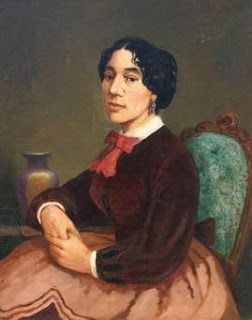I
have always had a passion for the Victorian fashions and was curious
about what the African American wore during the Victorian era. The
Victorian era was from 1837 to 1901. Though much research it seems that
the African American woman of the South began to wear the Victorian fashions after
the Civil War. It was at the time of Reconstruction, which lasted from 1865 to 1877,
The America Civil War was from 1861-1865. Many free blacks in the North were wearing the fashions long before that..
During this Reconstruction, women were gaining a sense of self
that extended beyond their households. While the country was divided
over racial issues, black women being educated on home care and on the fashions of the times.
There were schools for black young ladies to learn the decorum of the
day, They were taught how to dress in the latest Victorian fashion and
how to present themselves in public. Learning the proper social graces
would help then in gaining better position in life for them and their
family.
Young
Black Victorians in late 19th Century America were optimistic, and
hungry for culture and education. Manners ruled the day (and manners
ruled with an iron fist). It was an era where ladies were ladies, men
were gentlemen and corsets were worn tight.
During Google search of the Black Victoriana,
I came across some of the most beautiful photographs of the African
descent wearing Victorian fashions, I was so impressed that these
photographs were taken and still in existence for our heritage to value
and hold on to..
http://vintageblackfolk.wordpress.com/19th-century-portraits/
http://www.ipernity.com/doc/285591/album/397459
One
of the first of these photographs that I came across was taken of the
beautiful and talented Sissieretta Jones. I was inspired by how well
dressed she was for the times. These photographs are very important
because they document an aspect of black history that is generally never
spoken of.
Matilda Sissieretta Joyner Jones, known as Sissieretta Jones, (January 5, 1868 or 1869 – June 24,1933) was an African-American soprano. She sometimes was called "The Black Patti" in reference to Italian opera singer Adelina Patti. Jones' repertoire included grand opera, light opera, and popular music.
Elizabeth Jennings Graham photo source: Kansas Historical Foundation, photo circa 1854-1860
(1830-1901)
Elizabeth Jennings was a New York City schoolteacher whose 1854
defiance of a streetcar conductor’s order to leave his car helped
desegregate public transit in New York City. With the help of her
prominent father, the wealthy businessman Thomas L. Jennings, she filed
and won a lawsuit against the streetcar company. Thomas L. Jennings, the
first African-American to win a patent, owned a large clothing store
and co-founded the famous Abyssinian Baptist Church.
At this point, I should bring to your attention of the many
Black Women and Business Leaders of the 1800s And 1900s.
Christina Carteaux Bannister, businesswoman and “hair doctress”
Christina Carteaux Bannister (pictured right)
was born in Rhode Island
of mixed parentage, but she was most certainly a descendant of slaves
who worked in Rhode Island’s South County. She moved to Boston as a
young woman and took up the trade of hairdressing.
Amassing serious wealth as a self-proclaimed “hair doctress,” Bannister
married Canadian-born painter Edward Bannister and supported her husband
as he became a successful Black artist. The couple were friends and
lived with abolitionist Lewis Hayden and helped provide support to the
Underground Railroad.
David Ruggles, owner of first African-American bookstore
Abolitionist and journalist David Ruggles was instrumental in the
liberation of slaves as part of the famous Underground Railroad. After
learning Latin from a tutor who attended Yale University, Ruggles would
go on to publish works as a printer. A contributing journalist to
popular papers of the time, Ruggles most-notable achievement was opening
the first Black-owned bookstore in New York City.
Harriet E. Wilson, first African-American female novelist
http://debatesthatmatter.blogspot.com/2013/02/the-top-black-business-leaders-of-1800s.html
My
research is on going. There is so much to learn. I will be adding more
to this post as I find it. Also please feel free to comment and give
inspiration to this post.
Subscribe to:
Comments (Atom)
September Tea Travel
I am happy to say my tea time travels are on it's way. I have decided to visit as many tea shops and salons as I can. Will be looking t...

-
Christiana Carteaux Bannister: 19th Century Rhode Island Entrepreneur Join Mrs. Estelle Tucker Barada and the Warwick Historical Society fo...
-
Welcome to Hearthside House. The "Victorian Mourning" exhibit, on display this month at The Hearthside House in Lincoln, Rhode ...
-
I am happy to say my tea time travels are on it's way. I have decided to visit as many tea shops and salons as I can. Will be looking t...














No comments:
Post a Comment